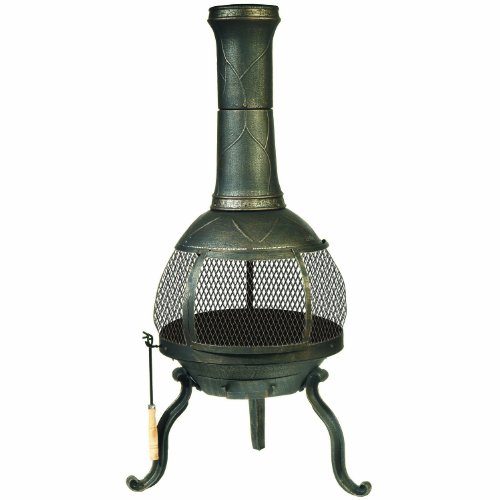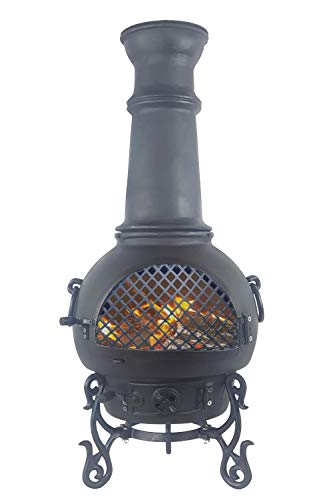A Sage Piece Of Advice On Chiminea Large From A Five-Year-Old
페이지 정보
Susie 24-11-01 22:34 view26 Comment0관련링크
본문
 Clay Chiminea Large
Clay Chiminea Large Chimineas made of clay are a great way to enjoy an outdoor fire. They are a bit more fragile than iron chimineas, and require particular attention to ensure that they last a long time.
Chimineas made of clay are a great way to enjoy an outdoor fire. They are a bit more fragile than iron chimineas, and require particular attention to ensure that they last a long time.Before using your chiminea for the first time fill it with sand 3-4 inches below the chiminea's mouth. This will protect the chiminea during the first few times from contact with flames and allow it to dry out.
Material
Since around 400 years, clay chimineas are used to heat the home and gather people around to share food and conversations. They are typically made from terracotta, although they are also available in a variety of materials, like cast iron and steel.
Cast iron is more durable and less susceptible to damage caused by sudden temperature fluctuations than Terracotta. However, it is susceptible to cracks or break easily if not protected from rain and snow. Terracotta can be more fragile but it is a gorgeous material that gives the chiminea an authentic Mexican-inspired appearance.
It is essential to make sure that the chiminea is cured before you start using it for the first time. This will prevent it from cracking over time from the sudden change in the temperature of the fire. This is accomplished by adding two to three inches (or more) of river sand to the bottom of the chiminea. Start by using small pieces and then increase the size of the wood gradually. After some small fires the clay should be ready to be used.
Clay chimineas can be sealed to prevent moisture from damaging the chimneys over time. This is a great idea for any fire pit outdoors. However, it is crucial for chimineas made of clay, as the clay absorbs moisture, and could crack if exposed excessively.
Clay chimineas are less likely to crack than metal chimineas. However, they still need to be handled with care to avoid moisture damage. Clay chimineas should be kept covered when not in use. Additionally, they should never be stored inside as repeated exposure to moisture may cause the clay to deteriorate or crack.
Clay chimineas are more heavy than other chimineas and should be placed on a base specifically designed for outdoor fire pits. A hearth for a patio is an excellent choice to accomplish this, since it creates a fire-safe zone on a wooden deck or patio. The patio hearth can be constructed using pavers or bricks, and it should be at a minimum a 3-by-4-foot space. If you don't want to construct a hearth for your patio, you could simply place the chiminea in a flat patch of garden soil. This is not recommended as it may break or crack in the course of time.
Size
Chimineas are now becoming more popular. They create a peaceful outdoor atmosphere, but they also generate a lot heat. This makes them ideal for cooking or just enjoying the company of family and friends. You can find them in various shapes and sizes, from traditional clay to modern chiminea cast iron or stainless steel. They are among the most versatile garden items available. They can be used in a variety of ways, including cooking, heating, and for decoration.
Chimineas are fragile and prone to cracking due to the fact that they have to be able to withstand changes in temperature and moisture. Therefore, it is essential to take care of them properly. It is always a good idea to get a cover for them since it protects them from rain damage that can cause them to become weaker and crack with time. It is also an excellent idea to place at least 50mm of sand, or Gardeco lava stones (see accessories above) on the bottom of the chimenea, to shield it from direct heat and help keep the hottest part of the fire directly touching the clay, which could cause it to crack.
It is also a good idea to put on a clay cap because it can prevent water seepage which again can cause them to crack and weaken over the years. Chimeneas that are capped with clay might be a bit more expensive, but they will last longer. Keep them away from flammable items since this could cause an accident. Also, never place them in a windy area because this could cause smoke to move in unexpected directions and make it difficult to use.
It is also a good idea, to seal your chimenea by using Butchers' wax or Future floor wax once or every two years. This will help protect the clay against the elements and make the clay more resistant to warping and cracking. If you have any doubt regarding how to care for your chimenea, or aren't sure of anything, do not hesitate to call us and we'll be happy to help.
Cooking
Chimineas are designed to be used outdoors for cooking, and a large selection of options is available. They are typically made of clay but can also be made from cast iron or aluminium. They can be powered by charcoal, wood or gas. A lot of models have built-in grates that make them ideal for cooking an array of outdoor meals.
Be aware of the material, size and design of an apex chiminea to determine the most suitable one for your needs. Cast iron and aluminum are durable and adaptable, whereas the traditional clay chiminea has a classic appearance and offers great heat distribution. Certain chimineas have additional features like tables for food preparation, which allow you to turn your fire into a centre of culinary activity.
Install your chiminea on an unfinished concrete, brick or stone patio after you've found the perfect location. It is important to not place it on a wood deck since sparks could escape from the fireplace and ignite any material that is flammable under it. It's also a good idea to keep it away from eaves and other overhead structures in case they catch fire.
To prepare your Clay Chiminea large chiminea to use, fill the bowl of the chiminea using coarse sand, 3 inches above the mouth of the chiminea. This will protect the area that is hot from flames and prevent it from damaging the clay. Next, create a small fire with paper and a lighter. Let it burn until it goes out naturally.
Let your chiminea cool down completely after the fire has been put out before moving it or adding fuel. This will reduce excessive smoke, decrease the risk of a chimney fire and improve your outdoor experience. Regular cleaning of the chiminea outdoor is necessary, as ash and debris can clog the chimney and reduce the airflow. Make sure you remove any ash and debris after every use, as well during the cooling process, to avoid damaging. Keep your chiminea protected and clean to ensure it lasts longer and performs at its best.
Maintenance
Regular cleaning, protective measures and following the proper guidelines for use are essential to keeping your Clay Chiminea in top condition and operating safely. These simple steps can help your chiminea last longer and provide safe, enjoyable fires all year long.
Chimineas are designed for small fires. It is important to start with a small fire pits chimineas and small logs, and then gradually increase the size of the fire over a number of uses. This allows the clay to cool slowly, reducing the chance of thermal shocks that could cause cracks in the clay.
It is recommended to put on a breathable cover for your chiminea when it's not being used, especially during wet weather or over night. A cover reduces the exposure of moisture and rain to the chiminea and can cause cracking over time. A ventilated cover also permits ventilation to avoid condensation buildup, which can harm the chiminea.
Extinguishing the chiminea properly is essential to ensure its long-term viability. Avoid using accelerants such as gasoline, coal briquettes, propane, or gasoline, which can damage the chiminea as well as create danger to your safety by releasing toxic fumes. Instead, you should extinguish the chiminea using a cover with sand or extinguishing the flames using a dry chemical fire extinguisher.
Keep your chiminea safe from branches and wires that hang over the edge, wooden fences and garden furniture. It's also recommended that the chiminea to be set on a nonflammable surface such as the patio of a stone or tile.
Lastly, it's essential to regularly inspect your chiminea for cracks or damage, particularly after heavy use or extreme weather conditions. Repair any damage quickly using the help of a clay-based repair kit. This will prevent the cracks from spreading further and causing damage to your chiminea.
Chiminesas can be a stunning focal point in your outdoor space and adds warmth and charm to any yard or patio. Chiminesas could be a wonderful addition to your home for many years with regular maintenance. Follow these simple tips to ensure that your chiminea lasts longer and safer than ever before.
댓글목록
등록된 댓글이 없습니다.